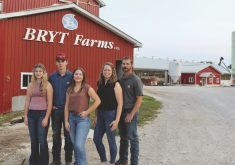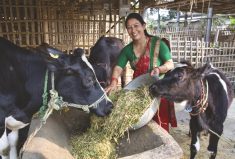In her other life as a school board trustee, Okanagan Valley chicken farmer Christina Coers sees the value of education. It’s a mindset that she brought with her when she and her husband Steven became chicken farmers under the new-entrant program of the British Columbia chicken-marketing board a year ago.
Coers, 46, didn’t grow up on a chicken farm, so she educated herself about chicken farming. “It was natural for me to want to share what I had learned with others,” she explains.
Coers says the myths and misinformation about chicken farming make her see red, such as the A&W restaurant ads that say the chicken they serve is hormone and steroid free. She says this implies that most chicken contains hormones and steroids.
Read Also

The big squeeze: How to be fair to siblings during farm succession
Managing sibling business relationships on family farms.
Except… that just isn’t the truth, she says. “It’s been illegal to use steroids and hormones in chicken production in Canada since the ’60s. People think that because chicken grows so fast, farmers must be using steroids, but it’s due to other things like better genetics.”
Coers has also experienced consumer confusion first hand. Standing in line at the meat counter at a local grocery store, she overheard the man in front of her ask if the store’s chicken was “free run.” The young woman working behind the counter had no idea.
Coers spoke up and explained that it most likely was free run since most chicken in Canada is raised this way, with free access to water and feed. It was during her discussion with this man that she realized he was confused by what free run, free range and organic meant.
It isn’t just the non-farming public that can be ill informed. Last year when a group of local dairy farmers made a stop at the Coers’ chicken farm, one of the dairy farmers expressed his surprise that the broiler chickens were not in cages. Even within agriculture there’s room for improvement, says Coers.
Coers believes farmers need to be proactive with their messaging. “We can’t expect the board to do all the work. It’s our industry, and as growers we’re a part of that.”
Consumers should be able to have confidence in the chicken they buy, she says. For example, the public doesn’t know that chicken farmers are licensed and that they must be audited every year to keep that licence.
Recently Coers volunteered with the BC Chicken Marketing Board to participate in a supermarket campaign that would put consumers in touch with chicken farmers. The idea was to put a face on a farmer and give consumers the opportunity to ask farmers questions, says Coers, who spent time in a grocery store in the nearby town of Salmon Arm.
The campaign was modelled after a similar campaign by beef producers. Hallmark, a local chicken processor, supplied free samples of chicken.
Coers put together a PowerPoint presentation of pictures from her farm showing the chickens at all stages of development. The photos were interspersed with facts about chicken farming and loaded onto a computer tablet that sat on a nearby table for easy viewing by those who were interested.
Most of the interest came from shoppers with young children. “Not too many people had concerns and there was only one vegetarian,” says Coers, who wonders if more people would have had questions in a more urban store.
As a school trustee, Coers has also made it known that her farm is available for school tours. Chickens are part of the kindergarten curriculum in British Columbia, so Coers has had kindergarten classes come to the farm.
While visitors are off limits on most chicken farms due to biosecurity risks, the Coers installed a large roll-up door in their barn when they had it built. This allows people to get a good look inside the barn without having to go inside and risk spreading disease.
“Kids are the future,” says Coers. “And if we set the record straight with them they’ll tell their parents.”
Listen first
For Emily den Haan, 24, who grew up on a purebred Holstein dairy farm near Alliston, Ont., farming is second nature. She says she took that for granted until she left the farm to attend the University of Guelph.
While pursuing a minor in music, den Haan interacted with a lot of students who didn’t come from farms. It was an eye-opener for her. “People had a lot of assumptions and a lot of questions. I could see there was a real disconnect between the farm and the non-farming public.”
After completing her degree, den Haan returned to the farm. She and her father manage the farm while her mother and older sister, Marianne, run the new dairy-processing plant where they bottle whole milk and make yogurt and kefir. They offer tours of the barn and the dairy to individuals and groups on a regular basis.
The tours give den Haan the opportunity to share her passion for farming, she says. “People have lots of questions about antibiotics, GMOs, organic and neonics.”
Sometimes people challenge her, and her first reaction is to get defensive. She says then you have to take a step back, take the emotion out of it, and use your knowledge to answer them. “You want to find out what they do know. It will help you with your answer,” she says. And you have to bring it down to their level so they understand, she adds.
Sometimes den Haan admits she doesn’t have the answers to their questions. She says sometimes she discovers it’s just the way they’ve always done things and there may actually be a better way. “When you dig down for the answer, it can help you as a producer.”
Den Haan’s parents, John and Bonnie, have always been active volunteers and have instilled the value of volunteerism in their children. She has also participated in the Grain Farmers of Ontario’s Grains in Action program which gives young farmers from across the province a better understanding of what happens to their corn, soybeans and wheat crops after they are delivered to the elevator.
While the program primarily helps participants have a better understanding of the full value chain in production, it also better prepares them to answer questions from the media.
Den Haan also shares her passion for agricultural education as a youth adviser for Ontario Agri-Food Education Inc. (Agriculture in the Classroom program). Since it’s only been six years since den Haan was in high school, she’s able to use her experience to help get youth engaged.
“It’s very rewarding to see people learn something new,” says den Haan with a smile.
10 tips for being a better farm ambassador
Whether you are hosting a farm tour, writing a letter to your local newspaper or simply standing in line at the grocery store talking to a stranger, here are 10 tips from Farm and Food Care Ontario to ensure you are being an effective ambassador for agriculture.
- Be positive. Think customer service with a smile!
- Know who you’re talking to and what their concerns are.
- Be prepared. Keep up to date with issues in the media.
- Use easy-to-understand words and explanations, not industry jargon.
- Provide comparisons that your audience can relate to.
- Use examples from your farm or your experience when answering questions, instead of guessing or generalizing.
- Show you care. Really.
- When answering a question, “I don’t know” is a valid answer. Refer them to someone else when appropriate.
- Invite discussion. Avoid debates and confrontations. Everyone is entitled to their opinion.
- Remember, you may be the only person in agriculture someone ever has the chance to meet. Make that impression memorable!
Don’t forget, as an ambassador for agriculture, you are always on duty!
Resources
The Farm and Food Care Foundation is a charitable organization dedicated to providing credible information about agriculture. It provides an ag ambassador tool kit on its website and training workshops across Canada. Visit the Farm and Food Care website for more details.
















